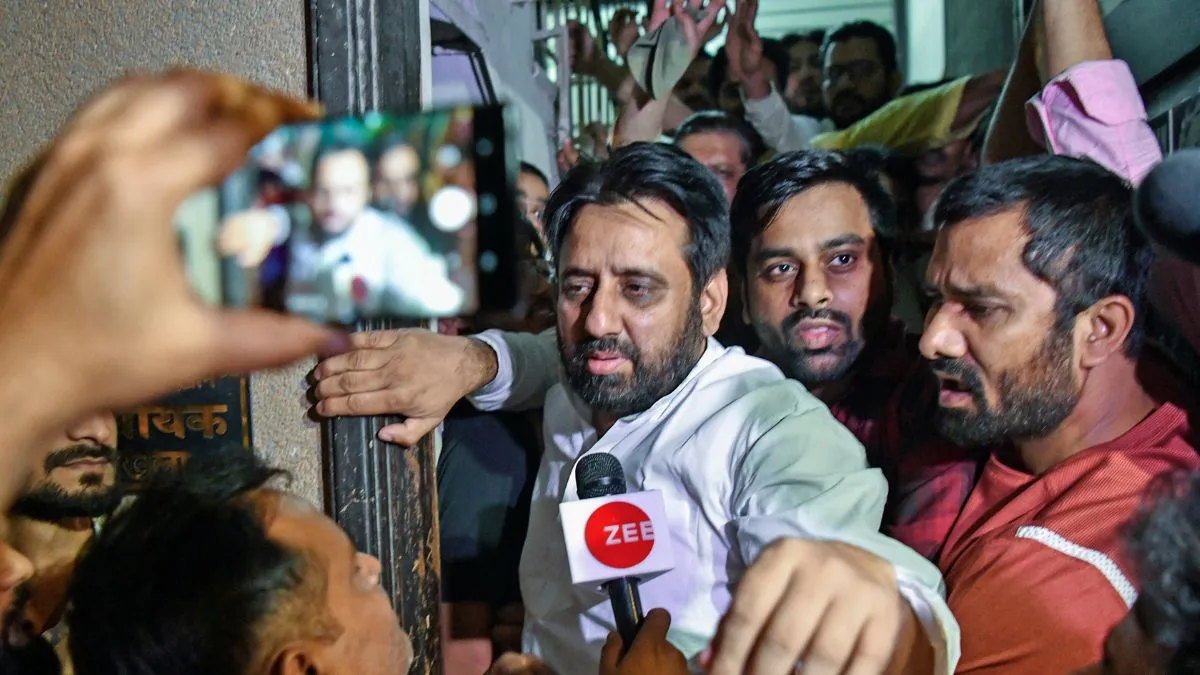Amanatullah Khan, an Aam Aadmi Social gathering (AAP) MLA, has been within the custody of the Enforcement Directorate (ED) since September 2, 2023, in reference to a cash laundering investigation linked to the Waqf Board rip-off. On Friday, September eighth, a Delhi court docket prolonged his custody by three days, elevating issues in regards to the alleged misuse of energy and political motives behind the arrest.
The Case and Khan’s Arrest
The ED’s investigation focuses on allegations of monetary irregularities throughout the Waqf Board, a physique liable for managing Islamic spiritual and charitable endowments. Khan, a outstanding member of the AAP, is suspected of being concerned in these alleged misappropriations.
On September 2nd, ED officers performed searches at Khan’s residence in Okhla, Delhi. Following these searches, Khan was taken into custody below the Prevention of Cash Laundering Act (PMLA). The ED claims that Khan was evasive throughout questioning, resulting in his arrest.
Khan, nevertheless, vehemently denied these accusations, alleging that the arrest was politically motivated and aimed toward silencing him. He identified that he had cooperated with the company by responding to their notices and that his mother-in-law, who lately underwent surgical procedure, was current at his residence throughout the arrest.
Political Fallout and Accusations of Misuse of Energy
Khan’s arrest has sparked controversy and raised issues in regards to the potential misuse of investigative companies for political acquire. The AAP, Khan’s political social gathering, has strongly condemned the arrest, characterizing it as a blatant try and suppress their voice and disrupt their work.
The social gathering contends that the ED’s actions are politically motivated and that Khan’s arrest is a tactic utilized by the BJP to realize an edge in upcoming elections. They spotlight that Khan has been below investigation by varied companies for the previous eight years with none substantial proof of wrongdoing.
Public Response and the Position of the ED
Public discourse round Khan’s arrest has been polarized, with supporters of the AAP condemning the ED’s actions as politically motivated and critics emphasizing the necessity for a good and neutral investigation.
The ED, nevertheless, maintains its stance that the investigation relies on sturdy proof and that the arrest was vital to assemble additional data and forestall the potential tampering of proof.
The function of the ED on this case raises vital questions in regards to the autonomy and objectivity of investigative companies. There are issues about whether or not the company is performing independently or whether it is getting used to focus on political opponents of the ruling social gathering.
Potential for Abuse of Energy
The usage of companies just like the ED for political functions has develop into a recurring theme in Indian politics. Critics argue that this undermines the rule of regulation and weakens the credibility of establishments liable for guaranteeing transparency and accountability.
Issues about Due Course of
Whereas Khan’s arrest could appear justified from a authorized standpoint, there are issues in regards to the velocity with which it was carried out and the alleged disregard for Khan’s private circumstances. These issues spotlight the potential for the abuse of energy by investigative companies, even when performing throughout the authorized framework.
Transferring Ahead
The case of Amanatullah Khan has as soon as once more dropped at the forefront the contentious relationship between politics and investigations in India.
The allegations in opposition to Khan, the ED’s actions, and the political fallout function a stark reminder of the fragile steadiness between due course of, political agendas, and public belief in establishments.
It’s essential for investigative companies to keep up their impartiality and focus solely on establishing info and upholding the regulation. Equally, political actors have to respect the judicial course of and be sure that the investigation unfolds with out undue interference or political affect.
Takeaways
- Khan’s arrest raises severe questions in regards to the political motivation behind the investigation.
- The case highlights the potential for misuse of investigative companies for political functions.
- The ED’s actions have sparked issues in regards to the company’s autonomy and the integrity of the investigation.
- This case underscores the significance of guaranteeing that investigations are carried out transparently and with out undue political affect.
- Public belief in establishments is paramount for a wholesome democracy, and actions just like the arrest of Khan threaten this belief.




